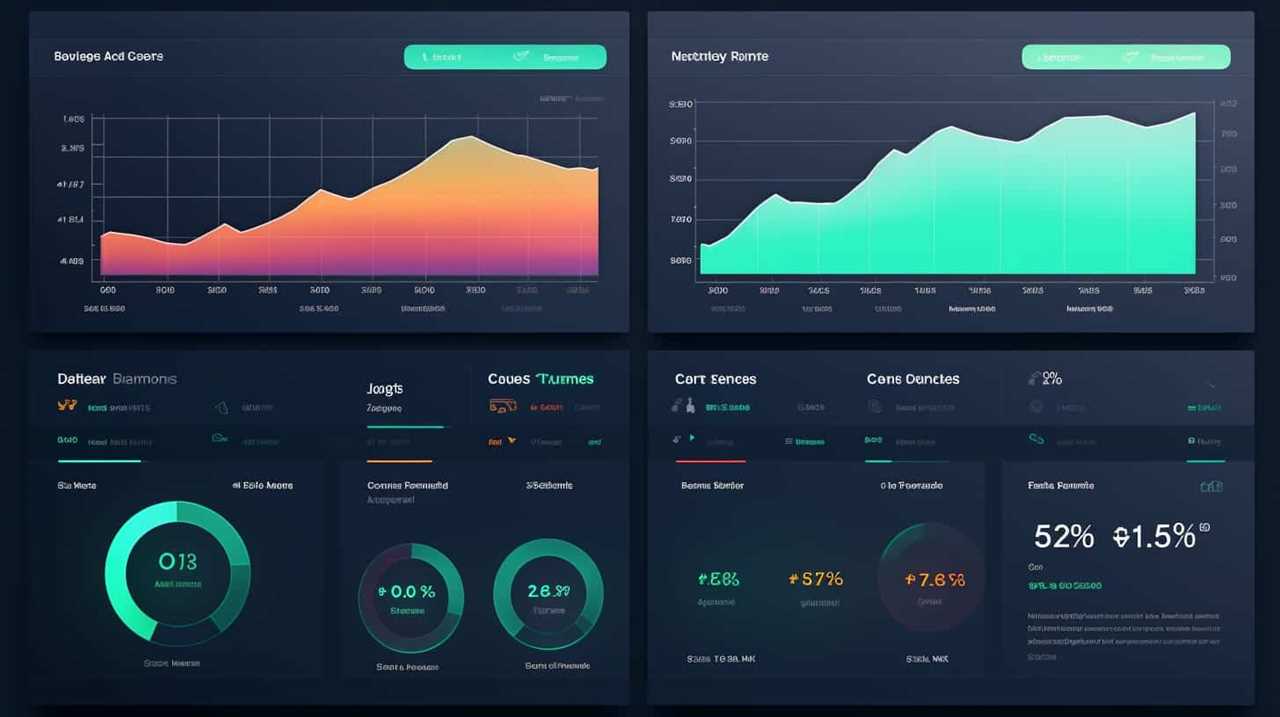In the field of digital marketing, there’s an ongoing debate: is SEO better understood as a marketing strategy or as a technical skill?
We, as experts in the field, have delved into this question to uncover the true nature of SEO.
Through our analysis, we have discovered that SEO is a powerful fusion of marketing strategies and technical expertise.
Join us as we explore the intricate relationship between marketing and tech in the realm of SEO, and unlock the secrets to mastering this dynamic field.

Key Takeaways
- SEO is a combination of marketing and technology, requiring a deep understanding of both disciplines.
- SEO is an indispensable component of digital marketing strategies, improving visibility and driving organic traffic.
- SEO techniques, such as optimizing keywords and meta tags, enhance website visibility and increase search engine rankings.
- Integrating SEO with content marketing and social media amplifies brand presence, drives traffic, and improves user experience.
Defining SEO: Marketing or Tech
When defining SEO, we approach it as a combination of marketing and technology.
SEO, or Search Engine Optimization, is the practice of improving a website’s visibility and ranking in search engine results pages. It involves various strategies and techniques that aim to increase organic traffic and attract relevant visitors to a website.
In the past, SEO was primarily seen as a technical discipline, focusing on optimizing website structure, code, and keywords. However, the evolving landscape of SEO has transformed it into a more holistic approach that incorporates marketing principles.
Today, SEO requires a deep understanding of both marketing and technology. It involves not only technical optimizations but also content creation, user experience, and social media engagement.

The Role of SEO in Digital Marketing
When it comes to the role of SEO in digital marketing, there are several key points to consider.
Firstly, SEO plays a crucial role in improving visibility and driving organic traffic to a website.
Additionally, it’s important to understand the difference between SEO and paid advertising, as they serve different purposes and require different strategies.
Lastly, integrating SEO with content marketing is essential for maximizing the impact of both strategies and ensuring long-term success in the digital landscape.

Seo’s Impact on Visibility
SEO plays a crucial role in enhancing the visibility of a website and driving organic traffic, making it an indispensable component of digital marketing strategies. Here are four key ways in which SEO impacts visibility:
- Improving search engine rankings: SEO techniques, such as optimizing keywords and meta tags, help websites rank higher in search engine results pages, increasing their visibility to potential customers.
- Enhancing website visibility: SEO involves optimizing various on-page and off-page elements, such as website structure, navigation, and backlinks, to improve user experience and make the website more visible to search engines.
- Increasing organic traffic: By targeting relevant keywords and optimizing content, SEO helps attract organic traffic from search engines, resulting in higher visibility and increased website visits.
- Building brand credibility: A strong SEO strategy helps establish a website as a reliable and authoritative source in its industry, leading to increased visibility and trust among potential customers.
As we delve into the next section about ‘SEO vs Paid Advertising,’ it’s important to understand the distinct advantages and limitations of each approach.
SEO Vs Paid Advertising
Moving forward, let’s explore the role of SEO in digital marketing by comparing it to paid advertising.
When it comes to driving traffic and increasing visibility online, businesses have the option to choose between paid advertising or organic SEO. While paid advertising can provide immediate results and targeted reach, organic SEO offers several benefits that make it a valuable long-term strategy.

Firstly, organic SEO is cost-effective as it doesn’t require continuous investment like paid advertising does. Additionally, organic SEO builds credibility and trust among users, as it relies on high-quality content and relevant keywords to rank higher in search results.
Furthermore, SEO allows businesses to capture a larger share of the search engine market, as more users tend to click on organic search results rather than paid ads. Ultimately, by investing in SEO, businesses can establish a strong online presence and drive sustainable organic traffic to their websites.
Integrating SEO and Content
As digital marketers, we understand the crucial role that integrating SEO and content plays in driving organic traffic and maximizing online visibility for businesses. Here are four key reasons why integrating SEO and content is essential for digital marketing success:
- Improved search engine rankings: By optimizing your content with relevant keywords and providing valuable information, you can increase your chances of ranking higher in search engine results pages.
- Enhanced user experience: Creating high-quality, engaging content not only attracts visitors but also keeps them on your website longer, reducing bounce rates and increasing conversions.
- Amplified social media presence: Integrating SEO and social media allows you to leverage the power of social platforms to promote your content, increase brand awareness, and drive traffic to your website.
- Measurable success: By closely monitoring key metrics such as organic traffic, keyword rankings, and conversion rates, you can measure the effectiveness of your SEO efforts and make data-driven decisions to refine your strategy.
Integrating SEO and content isn’t just a technical aspect of digital marketing; it’s a strategic approach that combines both creative and analytical elements to achieve desired results.

The Technical Aspects of SEO
We, as marketers, understand the importance of mastering the technical aspects of search engine optimization (SEO). When it comes to SEO, there are different components that need to be considered, including technical SEO, on-page SEO, and off-page SEO strategies.
Technical SEO focuses on the technical elements of a website that can impact its search engine visibility. This includes factors such as website speed, mobile optimization, site architecture, and indexing.
On-page SEO, on the other hand, involves optimizing individual web pages to improve their rankings and relevance to specific keywords. This includes optimizing meta tags, headings, content, and URLs.
Lastly, off-page SEO strategies involve building high-quality backlinks and establishing a strong online presence through social media and content marketing.

Mastering these technical aspects of SEO is crucial for marketers to ensure their websites are optimized for search engines and can attract targeted organic traffic.
Importance of Website Optimization for SEO
To understand the importance of website optimization for SEO, it’s essential to recognize how it directly impacts a company’s online visibility and search engine rankings. Here are four key reasons why website optimization is crucial for SEO:
- Improved Website Performance: Optimizing your website ensures that it loads quickly and smoothly, providing a better user experience. Slow-loading websites can lead to high bounce rates and lower search engine rankings.
- Higher Search Engine Rankings: Search engines prioritize websites that are optimized for performance, relevance, and user experience. By optimizing your website, you increase your chances of ranking higher in search engine results pages (SERPs).
- Enhanced Mobile Optimization: With the increasing use of mobile devices for internet browsing, having a mobile-friendly website is essential. Optimizing your website for mobile ensures that it’s responsive and accessible across different devices, improving your search engine rankings.
- Increased Organic Traffic: A well-optimized website attracts more organic traffic from search engines. By following SEO best practices, you can improve your website’s visibility, drive more targeted traffic, and ultimately increase conversions.
Content Optimization: Marketing or Tech
When it comes to content optimization, there are several key factors to consider.
First, the role of keywords can’t be overlooked. By strategically incorporating relevant keywords into your content, you can improve your search engine rankings and attract more organic traffic.

Additionally, the impact of user experience can’t be underestimated. Ensuring that your content is engaging, easy to navigate, and provides value to the reader is crucial for both SEO and overall marketing success.
Lastly, metadata plays an important role in content optimization. By optimizing your titles, meta descriptions, and other metadata elements, you can improve your click-through rates and increase visibility in search engine results.
Role of Keywords
Keywords play a crucial role in content optimization for SEO, whether it’s approached from a marketing or tech perspective. Understanding the role of keywords and conducting thorough keyword research is essential for achieving success in SEO.
Here are four key reasons why keywords are important:

- Relevance: Keywords help search engines understand the relevance of your content to user queries. By incorporating relevant keywords throughout your content, you increase the chances of your website appearing in search results.
- Visibility: Using the right keywords can improve your website’s visibility in search engine rankings. When you optimize your content with high-ranking keywords, you increase the likelihood of attracting organic traffic to your site.
- Competitive Advantage: Conducting keyword research allows you to identify gaps in the market and target less competitive keywords. This can give you a competitive advantage by enabling you to rank higher for specific search queries.
- User Intent: Keywords provide insights into user intent, allowing you to align your content with what your target audience is searching for. By understanding the intent behind keywords, you can create content that meets the needs and expectations of your audience.
User Experience Impact
Continuing the discussion from the previous subtopic, we can examine the impact of user experience on content optimization for SEO. User engagement and conversion rate optimization are two critical aspects that contribute to the success of a website’s SEO strategy.
When it comes to user experience, it’s essential to focus on creating high-quality content that’s relevant, informative, and engaging for the target audience. By providing valuable information and a seamless browsing experience, users are more likely to stay on the website, interact with the content, and convert into customers. This not only improves user satisfaction but also sends positive signals to search engines, leading to higher rankings.
Therefore, content optimization for SEO should be approached from both marketing and technical perspectives to achieve optimal results.
Transitioning into the subsequent section about the importance of metadata, it’s crucial to understand how metadata plays a significant role in enhancing a website’s visibility and relevance in search engine results.

Importance of Metadata?
To understand the significance of metadata in content optimization for SEO, we must recognize its role in enhancing a website’s visibility and relevance in search engine results. Metadata refers to the information that describes a webpage and helps search engines understand its content.
Here are four reasons why metadata is important for SEO:
- Improved website ranking: Metadata, such as title tags and meta descriptions, provides search engines with relevant information about a webpage, helping it rank higher in search results.
- Enhanced user experience: Well-optimized metadata makes it easier for users to find and understand your content, leading to a better overall experience.
- SEO techniques for mobile optimization: Mobile devices rely heavily on metadata to display search results effectively, making it crucial for mobile SEO optimization.
- Increased click-through rates: By incorporating compelling and relevant information in your metadata, you can attract more users to click on your website in search results.
Understanding the role of metadata in website ranking is essential for mastering SEO techniques. Next, let’s explore the importance of keywords in SEO.
The Role of Keywords in SEO
In our exploration of SEO as a marketing or tech, we delve into the crucial role that keywords play in optimizing digital content.

Keywords act as the foundation for successful SEO strategies, as they bridge the gap between what users search for and the content that websites provide.
Effective keyword research allows marketers to understand the language and phrases users employ when seeking information, products, or services online.
By aligning website content with these keywords, businesses can improve their visibility in search engine result pages (SERPs) and attract relevant traffic.
However, it isn’t enough to merely incorporate keywords into website content.

Marketers must also consider user intent, understanding the reasons behind search queries and tailoring content to provide valuable and relevant information.
Link Building: Marketing or Tech Strategy
Keywords play a crucial role in optimizing digital content, but another key strategy in SEO is link building, which is an essential marketing and tech strategy for improving search engine rankings and driving organic traffic.
Link building involves acquiring high-quality backlinks from reputable websites to your own, signaling to search engines that your content is valuable and trustworthy. Here are four effective link building techniques:
- Guest blogging: Writing and publishing articles on other websites in exchange for a link back to your site.
- Broken link building: Finding broken links on other websites and reaching out to the site owner to suggest replacing the broken link with a link to your own content.
- Content promotion: Actively promoting your content through social media, email marketing, and influencer outreach to encourage others to link to it.
- Creating valuable resources: Developing comprehensive guides, infographics, or tools that other websites would naturally want to link to.
Measuring link building success involves tracking metrics such as the number of backlinks, the quality of those links, and the increase in organic traffic to your site. By implementing effective link building strategies, you can improve your search engine rankings and drive organic traffic to your website.

Transition: Now that we understand the importance of link building, let’s explore how SEO analytics can bridge the gap between marketing and tech.
SEO Analytics: Bridging the Gap Between Marketing and Tech
SEO analytics serves as a vital tool for bridging the gap between marketing and tech, providing valuable insights into the performance and effectiveness of SEO strategies.
In today’s digital landscape, where data-driven decision making is paramount, measuring the success of SEO efforts is essential for optimizing marketing campaigns and improving website performance.
SEO analytics allows marketers to track key metrics such as organic traffic, keyword rankings, and conversion rates, enabling them to make data-backed decisions and allocate resources effectively.

By analyzing these metrics, marketers can identify areas of improvement, uncover opportunities for optimization, and understand user behavior to enhance overall SEO strategy.
With the ability to measure success through SEO analytics, marketers can align their efforts with technical teams, fostering collaboration and ensuring that marketing goals are aligned with technical capabilities.
As we delve into the future of SEO, it becomes evident that a fusion of marketing and tech is inevitable.
The Future of SEO: A Fusion of Marketing and Tech
As we explore the future of SEO, the merging of marketing and tech is becoming increasingly evident. The landscape of SEO is constantly evolving, and it’s crucial for businesses to stay ahead of the curve by adapting their SEO strategies to future trends.

Here are four key reasons why the future of SEO lies in a fusion of marketing and tech:
- Advanced algorithms: Search engines are becoming smarter and more sophisticated, relying on complex algorithms to deliver the most relevant search results. Marketers need to understand these algorithms and use technical SEO tactics to optimize their websites.
- User experience: Search engines are placing a greater emphasis on user experience. This means that marketers must focus on creating engaging and user-friendly websites, while also incorporating technical elements such as site speed and mobile optimization.
- Data-driven marketing: With the rise of big data, marketers need to harness the power of data to drive their SEO strategies. This requires technical expertise to analyze and interpret data, as well as marketing skills to turn insights into actionable strategies.
- Integration of AI and machine learning: Artificial intelligence and machine learning are revolutionizing the SEO landscape. Marketers need to understand how to leverage these technologies to enhance their SEO strategies and stay ahead of their competitors.
Frequently Asked Questions
How Does SEO Impact the Overall Marketing Strategy of a Business?
SEO integration is crucial in shaping a business’s overall marketing strategy. By optimizing website content, targeting relevant keywords, and improving search rankings, SEO increases visibility, organic traffic, and brand authority. Effective SEO measurement ensures continuous improvement and success.
What Are Some Common Technical Challenges Faced When Implementing SEO Strategies?
When it comes to implementing SEO strategies, we often face technical challenges. From optimizing websites for search engines to conducting thorough keyword research, these tasks require a deep understanding of both marketing and technology.
How Does Website Speed and Performance Affect SEO Rankings?
Website speed and performance directly impact SEO rankings. Slow loading times frustrate users and can lead to higher bounce rates. Optimizing website design and implementing mobile optimization are essential for improving user experience and boosting SEO success.

What Are Some Best Practices for Optimizing Content for Both Search Engines and Users?
To optimize content for both search engines and users, we focus on user engagement and keyword research. By creating valuable, relevant content and incorporating targeted keywords, we can increase visibility and drive organic traffic.
How Do Social Media Platforms and SEO Work Together to Improve Online Visibility?
Social media integration and SEO work together to improve online visibility. By leveraging keyword research techniques, we strategically optimize content for search engines and engage with users on social platforms to drive traffic and increase brand visibility.
Conclusion
In conclusion, SEO isn’t just a marketing or tech aspect, but a powerful fusion of both. It’s the engine that drives digital marketing strategies and the technical foundation that supports website optimization.
Like a well-oiled machine, SEO requires strategic planning, analytical insights, and persuasive techniques to succeed in the competitive online landscape.

As the future of SEO unfolds, this harmonious blend of marketing and tech will continue to evolve, propelling businesses towards greater visibility and success.









